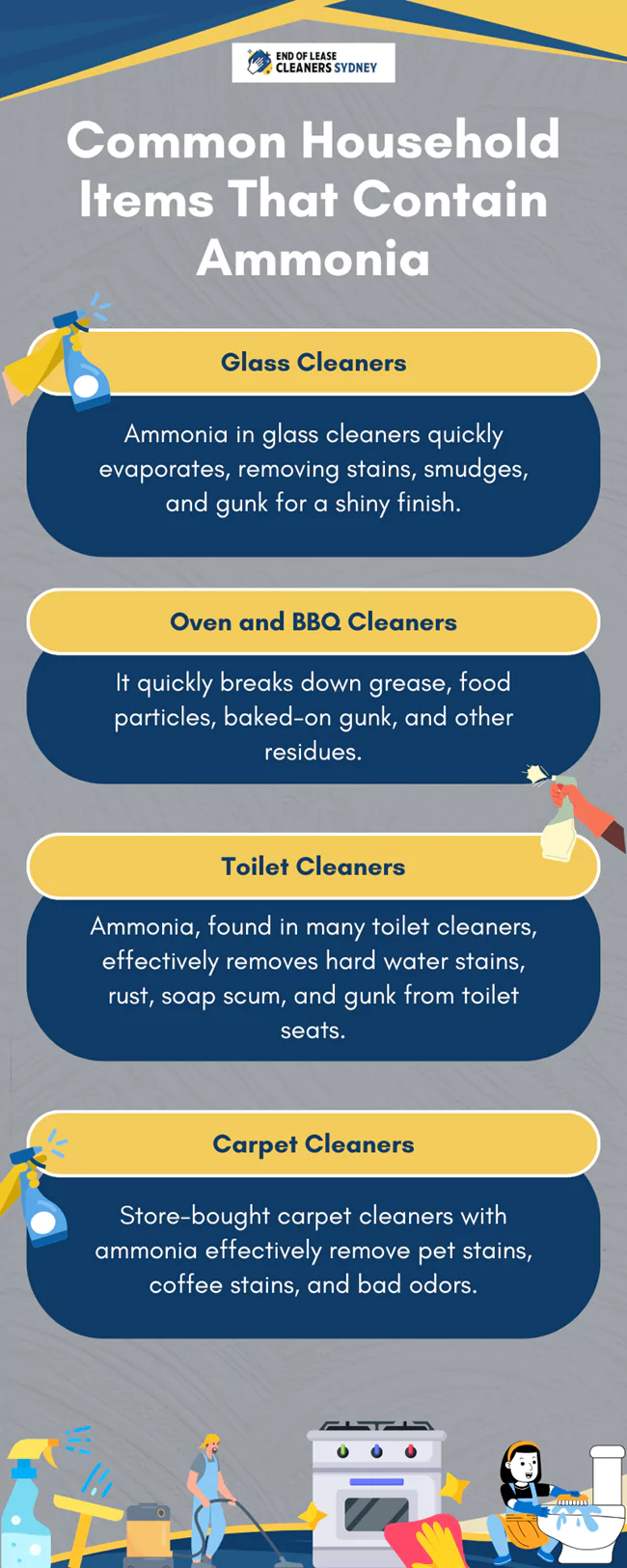Do you know the one common ingredient in almost all store-bought household cleaners? It is none other than Ammonia, an inorganic chemical compound of nitrogen and hydrogen (NH3). It is a colourless gas and highly corrosive that can effectively remove stubborn stains, grime, grime and gunk without much elbow grease, saving you time and energy.
Of course, this abrasive chemical can achieve sparkling results, but ensure you use it cautiously. The toxic fumes and volatile organic compounds make Ammonia one of the harmful agents in household cleaning. It can pose serious health concerns, including respiratory disorders, eye irritation, skin irritation, and other allergies. Regular use of ammonia-based household cleaners can lead to air and water pollution. Thus, many people are switching towards natural or safer alternatives. Even cleaning companies have been leveraging eco-friendly products for quality end of lease cleaning in Sydney.
As a responsible consumer, create awareness and read the labels before buying any store-bought cleaning product, even if it is a green cleaning agent. In this post, we'll share a list of cleaning products containing Ammonia. Ensure you handle it safely when tackling dirt and stains around your home.
Let’s Get Started!
1. Why is Ammonia Used in Traditional Cleaning Products?
Ammonia, a colourless gas, is produced from methane and air. It has a strong and pungent odour but works wonders on stubborn stains and grime. The basic pH of Ammonia enables it to break down acidic stains and dislodge grime in no time.
The best part is that ammonia-based cleaning solvents evaporate quickly, helping you streak-free and spotless results. Its powerful chemical reaction can save you time, energy and money, especially when preparing your property for the final rental inspection or special occasions.
2. Common Store-Bought Cleaning Products Containing Ammonia

The chemical compound of nitrogen and hydrogen makes this ingredient common in almost all traditional cleaning products. Make sure you read the labels of the following solvents:
- Glass Cleaners: Ammonia is the primary chemical in store-bought glass and mirror cleaners- thanks to its quick evaporation potential. It can effectively remove stains, smudges and gunk while helping you achieve shiny results.
- Oven and BBQ Cleaners: It can break down buildup grease, stuck food particles, baked-on gunk and other residues in no time.
- Toilet Cleaners: A common ingredient in different brands of toilet cleaners is Ammonia. It can effectively remove hard water stains, rust, soap scum and gunk from your toilet seat.
- Drain Cleaners: The chemical has the potential to break down organic matter, including hair, from clogged drains.
- Carpet Cleaners: Remove pet stains, coffee stains and bad odours like a pro using store-bought carpet cleaner containing Ammonia.
It is also used as a multi-purpose cleaning agent for different types of flooring, windows, blinds, air vents, faucets, stainless steel surfaces, etc.
3. Health and Environmental Hazards of Ammonia
According to best end of lease cleaners Sydney, excessive exposure to ammonia-based cleaning agents can lead to various health and environmental challenges. Inhaling the pungent smell can cause respiratory disorders, such as coughing, runny nose, and even breathing issues. It can also trigger your allergies and pre-existing asthma symptoms. You may also experience eye and skin irritation if not used properly.
What’s worse? Ammonia is a highly volatile compound, causing indoor air pollution, water pollution and other serious environmental threats. It produces various greenhouse gases, posing a serious threat to the entire ecosystem.
It is also recommended to keep store-bought cleaning agents away from kids and pets. Ensure you visit a doctor immediately if they mistakenly ingested the product- serious caution is needed. Also, focus on incorporating cleaning tips that are safe for allergy sufferers or people with a weak immunity system.
4. Safety Precautions to Keep in Mind
Believe it or not! Careful handling should be your topmost priority when using store-bought household cleaners. Consider the following tips to keep yourself and the family safe and sound:
- Always wear gloves and a face mask when using such products to prevent toxic fumes
- Ensure proper ventilation in the room when sprucing up your property
- Never mix Ammonia with other cleaning products or chemicals
- Store all products away from kids and pets
- Follow the manufacturer’s instructions on the cleaning product label.
- Test the product on a hidden area to prevent damage.
5. Natural Alternatives to Ammonia-Based Cleaners
Nothing is better than finding the right substitute for an ammonia-based cleaning agent. Whether you have pre-existing allergy symptoms or want to adopt a sustainable lifestyle, making the right choices can make a huge difference.
You can use white vinegar, baking soda, hydrogen peroxide, liquid castile soap, lemon, and essential oils to spruce up your home without causing indoor pollution. White vinegar is a great glass cleaner while baking soda can effectively dislodge grease, grime and gunk. Hydrogen peroxide can remove mould and mildew without leaving a pungent smell behind. If you are at the end of your tenancy, book experts for a thorough end of lease cleaning Sydney and secure the hard-earned bond money. They also use eco-friendly combinations to achieve streak-free results.
Common Household Items That Contain Ammonia

Wrapping Up
Ammonia is a stable chemical ingredient in commercial cleaning products. Of course, ammonia-based products are effective, but can lead to air pollution, respiratory problems, asthma triggers, allergies and infections. Thus, read the label carefully and opt for greener, safer options for a healthy, hygienic indoor environment.